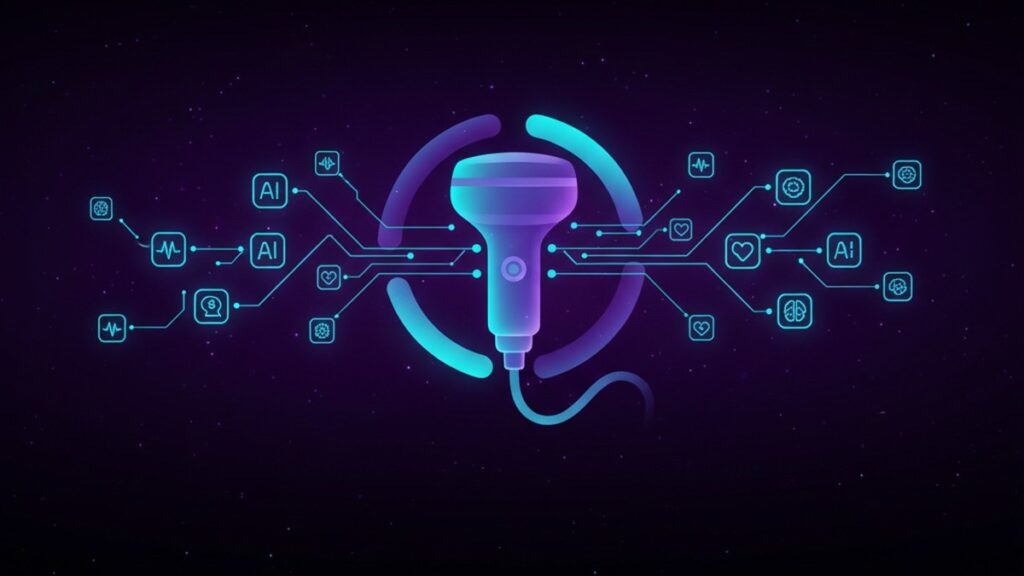Samsung, the tech giant known for its cutting-edge innovations, has taken a significant step forward in the healthcare industry. By partnering with Galeon, a decentralized science protocol, Samsung aims to enhance its ultrasound devices with advanced AI features. This collaboration is set to revolutionize how medical professionals utilize ultrasound technology by incorporating blockchain-driven AI capabilities that promise to improve diagnostic accuracy and efficiency.
A Revolutionary Partnership
In a bold move, Samsung has joined forces with Galeon to bring blockchain technology into the realm of medical imaging. Galeon, renowned for its decentralized approach to scientific research, will provide the necessary AI training data to Samsung. This data, crucial for developing sophisticated AI algorithms, is anonymized to ensure patient privacy, aligning with global data protection standards.
Blockchain’s integration into healthcare isn’t new, but its application in medical imaging, particularly in ultrasound devices, marks a pioneering effort. By leveraging blockchain, Samsung and Galeon aim to create a robust AI system that can learn and adapt quickly, improving the accuracy of ultrasound readings and aiding in more precise diagnoses.
Enhancing Diagnostic Precision
Ultrasound devices are indispensable tools in modern medicine, used in everything from prenatal scans to diagnosing conditions in various organs. However, the interpretation of ultrasound images often requires a high level of expertise and can be subject to human error. By integrating AI, Samsung aims to reduce these errors, providing healthcare professionals with a more reliable tool for diagnosis.
The AI developed through this partnership will be trained on vast amounts of anonymized data, allowing it to recognize patterns and anomalies more effectively than traditional methods. This could lead to faster, more accurate diagnoses, ultimately improving patient outcomes. For instance, in obstetrics, AI-enhanced ultrasounds could better predict potential complications, offering doctors more time to prepare and respond.
Addressing Privacy Concerns
One of the most significant challenges in utilizing AI within healthcare is ensuring patient data remains secure. Samsung and Galeon have tackled this issue head-on by employing blockchain technology to anonymize and protect data. This ensures that while the AI system learns from vast datasets, patient identities remain confidential.
Blockchain’s decentralized nature means that no single entity controls the data, reducing the risk of breaches and misuse. This approach not only enhances security but also builds trust among patients and healthcare providers, encouraging broader adoption of AI tools in medical settings.
Industry Perspectives
The collaboration between Samsung and Galeon has garnered attention from various stakeholders in the healthcare and tech industries. Proponents highlight the potential benefits, such as increased diagnostic accuracy and efficiency. Dr. Emily Rodriguez, a radiologist at a leading hospital, notes, “AI in ultrasound could be a game-changer, especially in rural or underserved areas where access to specialists is limited.”
However, there are also voices of caution. Some experts warn that over-reliance on AI could lead to complacency among medical professionals. Dr. Michael Lee, a healthcare ethicist, emphasizes the importance of maintaining a balance. “AI should augment, not replace, human expertise,” he says. “While technology can assist in diagnosis, the final interpretation should always involve a qualified professional.”
Future Implications
The Samsung-Galeon partnership could set a precedent for future collaborations between tech companies and the healthcare sector. As AI continues to evolve, its applications in medicine are expected to expand, offering new tools for diagnosis and treatment. The success of this venture could encourage other tech giants to explore similar partnerships, accelerating the integration of AI in healthcare.
Looking ahead, the implications for patient care are profound. AI-enhanced ultrasound devices could lead to earlier detection of diseases, more personalized treatment plans, and ultimately, better health outcomes. Additionally, by making advanced diagnostic tools more accessible, this technology could help bridge gaps in healthcare availability, particularly in developing regions.
Conclusion
Samsung’s integration of blockchain and AI into its ultrasound devices represents a significant advancement in medical technology. By partnering with Galeon, Samsung is not only enhancing the capabilities of its products but also setting a new standard for privacy and security in the use of AI in healthcare. As this technology continues to develop, it will be crucial to balance innovation with ethical considerations, ensuring that AI remains a tool that empowers healthcare professionals and improves patient care.

Steve Gregory is a lawyer in the United States who specializes in licensing for cryptocurrency companies and products. Steve began his career as an attorney in 2015 but made the switch to working in cryptocurrency full time shortly after joining the original team at Gemini Trust Company, an early cryptocurrency exchange based in New York City. Steve then joined CEX.io and was able to launch their regulated US-based cryptocurrency. Steve then went on to become the CEO at currency.com when he ran for four years and was able to lead currency.com to being fully acquired in 2025.




